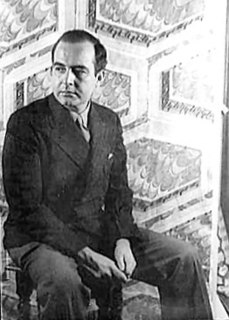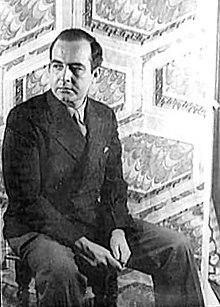
Top Hat is a 1935 American musical screwball comedy film in which Fred Astaire plays an American tap dancer named Jerry Travers, who comes to London to star in a show produced by Horace Hardwick. He meets and attempts to impress Dale Tremont to win her affection. The film also features Eric Blore as Hardwick's valet Bates, Erik Rhodes as Alberto Beddini, a fashion designer and rival for Dale's affections, and Helen Broderick as Hardwick's long-suffering wife Madge.

Samuel Osmond Barber II was an American composer, pianist, conductor, baritone, and music educator, and one of the most celebrated composers of the 20th century. The music critic Donal Henahan stated, "Probably no other American composer has ever enjoyed such early, such persistent and such long-lasting acclaim." Principally influenced by nine years of composition studies with Rosario Scalero at the Curtis Institute and more than twenty-five years of study with his uncle, the composer Sidney Homer, Barber's music usually eschewed the experimental trends of musical modernism in favor of utilizing traditional 19th-century harmonic language and formal structure that embraced lyricism and emotional expression. However, elements of modernism were adopted by Barber after 1940 in a limited number of his compositions, such as an increased use of dissonance and chromaticism in the Cello Concerto (1945) and Medea's Dance of Vengeance (1955), and the use of tonal ambiguity and a narrow use of serialism in his Piano Sonata (1949), Prayers of Kierkegaard (1954), and Nocturne (1959).

Alcina is a 1735 opera seria by George Frideric Handel. Handel used the libretto of L'isola di Alcina, an opera that was set in 1728 in Rome by Riccardo Broschi, which he acquired the year after during his travels in Italy. Partly altered for better conformity, the story was originally taken from Ludovico Ariosto's Orlando furioso, an epic poem. The opera contains several musical sequences with opportunity for dance: these were composed for dancer Marie Sallé.

Richard Smith "Billy "Vaughn was an American singer, multi-instrumentalist, orchestra leader, and A&R man for Dot Records.

Adagio for Strings is a work by Samuel Barber, arguably his best known, arranged for string orchestra from the second movement of his String Quartet, Op. 11.

Vanessa is an American opera in three acts by Samuel Barber, opus 32, with an original English libretto by Gian Carlo Menotti. It was composed in 1956–1957 and was first performed at the Metropolitan Opera in New York City on January 15, 1958 under the baton of Dimitri Mitropoulos in a production designed by Cecil Beaton and directed by Menotti. Barber revised the opera in 1964, reducing the four acts to the three-act version most commonly performed today.

The Old Maid and the Thief is a radio opera in one act by Italian-American composer Gian Carlo Menotti. The work uses an English language libretto by the composer which tells a twisted tale of morals and evil womanly power. Menotti writes in the libretto "The devil couldn't do what a woman can- Make a thief out of an honest man."

Amahl and the Night Visitors is an opera in one act by Gian Carlo Menotti with an original English libretto by the composer. It was commissioned by NBC and first performed by the NBC Opera Theatre on December 24, 1951, in New York City at NBC Studio 8H in Rockefeller Center, where it was broadcast live on television from that venue as the debut production of the Hallmark Hall of Fame. It was the first opera specifically composed for television in the United States.

Charlie Stubbs is a fictional character from the British ITV soap opera Coronation Street, played by Bill Ward. He made his first appearance during the episode broadcast on 10 November 2003 and last appearance on 15 January 2007.

The Telephone, or L'Amour à trois is an English-language comic opera in one act by Gian Carlo Menotti, both words and music. It was written for production by the Ballet Society and was first presented on a double bill with Menotti's The Medium at the Heckscher Theater, New York City, February 18–20, 1947. The Broadway production took place on May 1, 1947, at the Ethel Barrymore Theatre. The Metropolitan Opera Company presented it once, at the Lewisohn Stadium, on July 31, 1965.
Patricia Neway was an American operatic soprano and musical theatre actress who had an active international career during the mid-1940s through the 1970s. One of the few performers of her day to enjoy equal success on both the opera and musical theatre stages, she was a regular performer on both Broadway and at the New York City Opera during the 1950s and 1960s.
Cymbeline or Cymbaline may refer to:
Donald Nally is an American conductor, chorus master, and professor of conducting, specializing in chamber choirs, opera, and new music. He is conductor of the professional new-music choir, The Crossing, based in Philadelphia. He teaches graduate students at Northwestern University's Bienen School of Music.
"La donna è mobile" is the Duke of Mantua's canzone from the beginning of act 3 of Giuseppe Verdi's opera Rigoletto (1851). The canzone is famous as a showcase for tenors. Raffaele Mirate's performance of the bravura aria at the opera's 1851 premiere was hailed as the highlight of the evening. Before the opera's first public performance, the aria was rehearsed under tight secrecy: a necessary precaution, as "La donna è mobile" proved to be incredibly catchy, and soon after the aria's first public performance it became popular to sing among Venetian gondoliers.

Christopher Keene was an American conductor.
Marie Powers (1902–1973) was an American contralto who was best known for her performance as Madame Flora in Gian Carlo Menotti’s The Medium, a role that she played on stage, screen and television.
Excursions, Op. 20, is the first published solo piano piece by Samuel Barber. Barber himself explains:
These are ‘Excursions’ in small classical forms into regional American idioms. Their rhythmic characteristics, as well as their source in folk material and their scoring, reminiscent of local instruments are easily recognized.

Help, Help, the Globolinks! is an opera in four scenes by Gian Carlo Menotti with an original English libretto by the composer. It was commissioned by the Hamburg State Opera and first performed as Hilfe, Hilfe, die Globolinks! in a German translation by Kurt Honolka on December 21, 1968, in a double bill with Menotti's Amahl and the Night Visitors. The opera had its English language premiere on August 1, 1969, in the United States at the Santa Fe Opera in a double bill with Igor Stravinsky's The Nightingale. Both premiere productions were directed by the composer. Many of the cast members from the Santa Fe production reprised their roles for the work's New York debut at the New York City Opera in December 1969.

La Loca(The Madwoman), also known as Juana la Loca(Crazy Joanna), is an opera by Gian Carlo Menotti, composed in 1979. It is a romantic drama about the life of Joanna of Castille (1479–1555). It was written as a vehicle for soprano Beverly Sills and received its premiere on June 3, 1979, at the San Diego Opera, followed by the New York City Opera. Critical response was largely negative, so Menotti completely reworked it. The revised version premiered in 1982 at the Festival of Two Worlds in Spoleto, Italy. The American premiere of the revised version took place at the Spoleto Festival USA in Charleston, South Carolina, on June 1, 1984.

Gian Carlo Menotti was an Italian-American composer, librettist, director, and playwright who is primarily known for his output of 25 operas. Although he often referred to himself as an American composer, he kept his Italian citizenship. One of the most frequently performed opera composers of the 20th century, his most successful works were written in the 1940s and 1950s. Highly influenced by Giacomo Puccini and Modest Mussorgsky, Menotti further developed the verismo tradition of opera in the post-World War II era. Rejecting atonality and the aesthetic of the Second Viennese School, Menotti's music is characterized by expressive lyricism which carefully sets language to natural rhythms in ways that highlight textual meaning and underscore dramatic intent.









